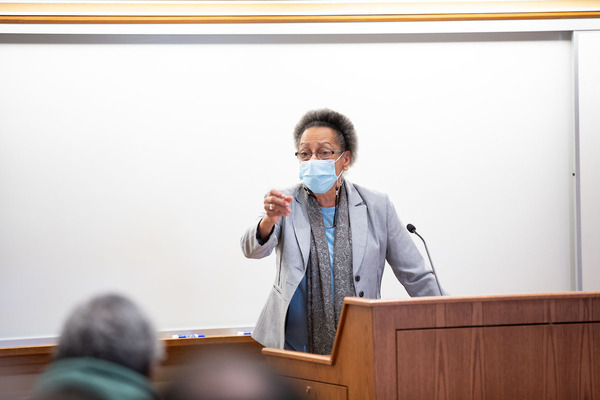
The continued discrimination and oppression of women’s rights around the world and a call for actual change were the themes of a talk on Thursday, March 2, co-sponsored by Notre Dame Law School and the Klau Institute for Civil and Human Rights.
The talk, “Protecting All Women’s Rights in the Developing World,” featured three speakers who were introduced by Diane Desierto, professor of law and faculty director for the Law School’s LL.M. Program in International Human Rights Law. Each speaker challenged the audience with a key question to think about, and invited them to join the fight to dismantle gender oppression and demand equality for women and girls.
Why are we not progressing respecting women and humankind?

The first speaker, Margarette May Macaulay, is from Jamaica and is the newly-elected president for the Inter-American Commission on Human Rights. She spoke about the continued oppression and violence of women and young girls, especially in Jamaica, and the lack of the presence of women in professional and influential positions, such as judges and commissioners.
When she first joined the Inter-American Commission on Human Rights she was shocked by the lack of gender and racial diversity, saying, “How can we represent so many diverse people when we don’t look like the place we represent.”
She said that the violence towards women, especially of young girls, further permeates the cycle of oppression. One grievous crime she described is that it is still legal for young girls in Jamaica to be forced to marry at ages where they are unable to actually consent to marriage.
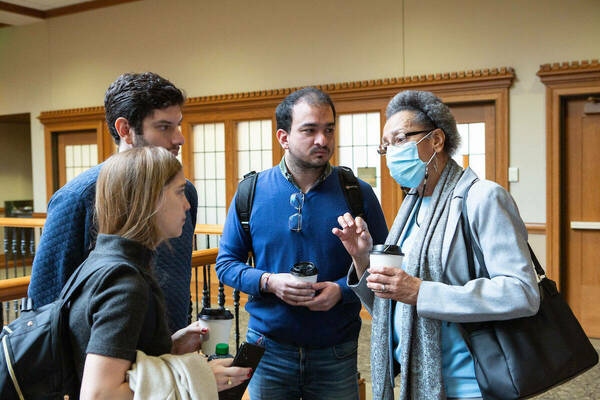
Macaulay has spent over 40 years as a leading human rights advocate and as a former judge on the Inter-American Court of Human Rights fighting for the rights of women.
While she continues the fight, Macaulay has grown weary of the system because of the lack of change. She says that the lives of women continue to be broken and that the government does not take action required to enhance the lives of women so they could go on to have productive lives.
“We have to do something better and we have to do it on an equitable basis,” said Macaulay. “As the years go by we should grow in responsibility and understanding that each of us has an innate dignity of humankind that we should respect.”
She pointed out that women still lack positions of power in the government, do not get jobs even when they are more qualified than male candidates, and do not get the same education as men do.
“It is vitally important to recognize that human rights must begin by ensuring that all women, in all stages of life and diversity of races, are included in every discourse, policy making, and the amending and framing of the law. We must demand this as a right,” said Macaulay.
Women’s narratives are missing from decision-making processes. What if they were heard? Would the fall of Afghanistan have been prevented?
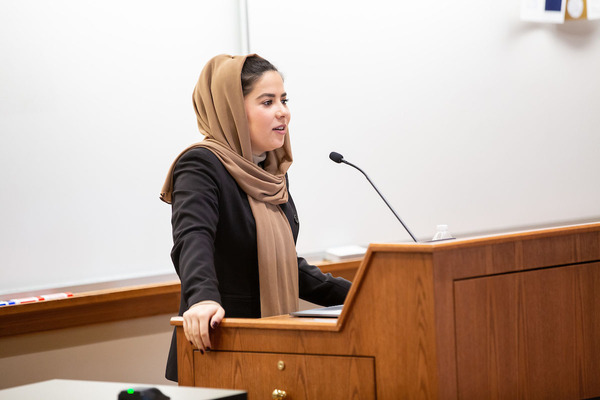
Tahmina Sobat ’20 LL.M., a human rights lawyer from Afghanistan and graduate of Notre Dame Law School’s LL.M. Program in International Human Rights Law, is currently a Ph.D. student at the University of Minnesota. She said the deterioration of the rights of Afghan women was one of the immediate foreseeable consequences of the Taliban’s takeover of Afghanistan in August 2021.
Despite their promise to be more moderate, the Taliban have implemented their restrictive interpretation of Sharia law in the broadest possible manner, institutionalizing heavy restrictions on women’s rights and bodily autonomy, Sobat said. These restrictions reached their peak when the Taliban officially banned women from their right to employment and education in September 2022.
“This is the typical practice of instrumentalization of women’s rights and bodies for diverse political and geopolitical projects,” said Sobat.
She shared throughout history Afghan women’s continued resistance and long-standing advocacies brought about a lot of progression for Afghanistan including but not limited to legal, constitutional, and political advancements. She added that women had fought very hard for every single right they had, but unfortunately now all of that work is being undone.
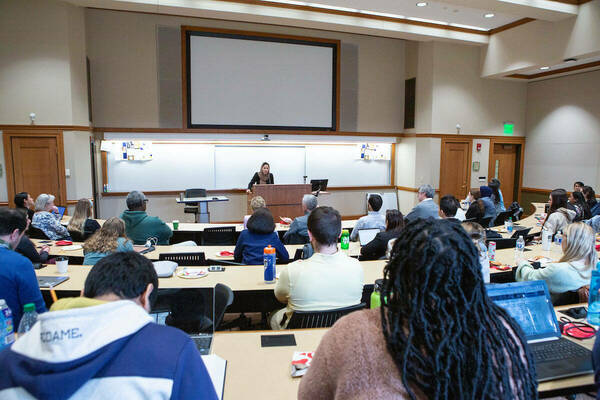
When the U.S. and Taliban began peace talks a few years ago, the protection of those basic rights, particularly for women and minorities, were not on the table.
“Women’s voices were not heard and included,” said Sobat. “What would have happened if these diverse needs and voices were heard and included in the peace process?”
She further said, “It is our responsibility to have deep moments of thinking about how we can bring change and how we can break the cycle and misery of women and have transnational solidarity, one that is conscious of the inequalities of power between the local and global, takes the histories of militarism, imperialism, and settler colonialism seriously, and aims to work through these inequalities while recognizing the experiences and specificities of Afghan, Iranian … women’s situations and lives.”
She invited everyone to join Afghan women’s resistance against the Taliban.
“Afghan women are standing against the Taliban while the world is ignoring the question of Afghanistan and Afghan women. This is redefining maps of resilience. Please join, converse, and stand with them,” said Sobat.
Can international pressure change the Taliban’s policies concerning women in Afghanistan?
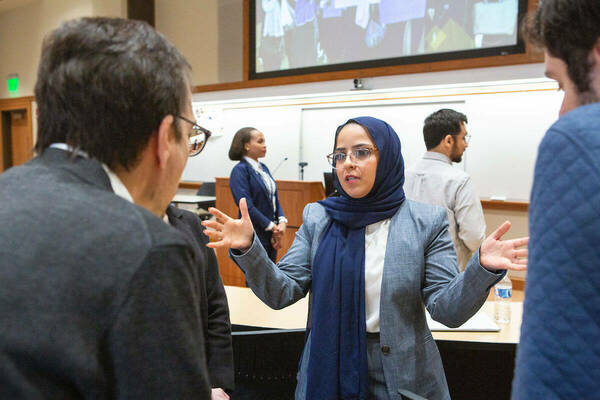
Roqia Samim ’22 LL.M is also a graduate of the Law School’s LL.M. Program in International Human Rights Law and was recently appointed as the program’s first Global Human Rights Fellow.
Samim also spoke about the current isolation of women in Afghanistan and how they are being denied access to basic human rights.
She said the Taliban’s first act upon taking power was abolishing all of the rights Afghan women had worked so hard for, starting with the ban on girls attending secondary and high schools. The ban on women’s employment and higher education soon followed. She said they have since replaced every human right including access to health care, personal autonomy, and freedom of movement and expression.
“All human rights are indivisible, interrelated, and interdependent. One human right cannot be enjoyed fully without the other. Taking away one human right negatively affects many other rights,” said Samim.
She explained about other damaging effects on women and young girls. For example, excluding women and girls from education prevents them from reaching their full potential. Not only does it violate women’s fundamental right to access education, but it also exposes them to heightened anxiety, trauma, feelings of valuelessness, and greater risk of exploitation and abuse. Due to Afghanistan’s dire economic situation and increased poverty, families have been forced to make desperate choices, such as putting children — especially girls — into child labor and marrying girls off at a very young age.
“In the eyes of the world, Afghanistan has become the worst country to be a woman in. Women in that country are deprived of all fundamental human rights. The future of Afghan women and the future of an entire generation is at stake, yet there is a disturbing lack of international outrage over this tragedy,” said Samim.
Last month, Samim and Sobat wrote “Afghan Women’s Rights as Taliban’s Bargaining Tool for International Recognition,” which calls for the United Nations to actively respond to Afghan women’s advocacies and demands to restore their rights and deny any type of recognition to the Taliban de-facto authorities.
They believe the Taliban’s war against women is a systematic war resulting from the international communities’ bad politics and un-strategic process of peace. They emphasized that the main motive for the Taliban’s exclusionary policies against women and for taking their rights hostage is to use it as a bargaining chip for their political interests and to gain international recognition.
“Ignoring Afghanistan is not a solution. There is a dire need to act,” said Samim.
What will you do?
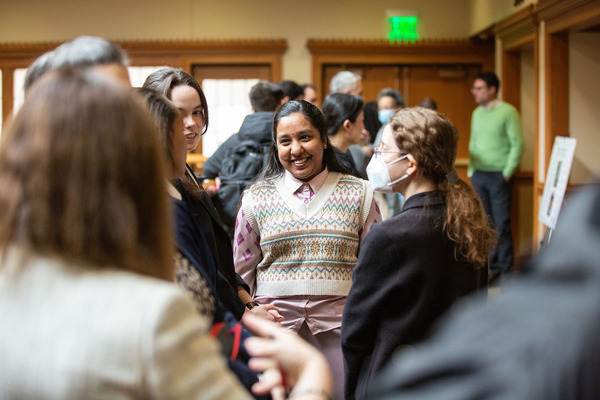
Jennifer Mason McAward, associate professor of law and director of Klau Institute for Civil and Human Rights, thanked the speakers for teaching, challenging, and counseling the audience and asked the audience to consider an additional question.
“How are each of you during your time at Notre Dame going to grapple with these questions? How do these questions form you into a graduate of Notre Dame and prompt you to do something to advance the rights of women and children?” said McAward.
Christine Venter, director of the Law School’s Legal Writing Program, lived in South Africa during apartheid. She wrapped up the session on March 2 by urging students to commit and continue to fight for the rights of women that were shared by the speakers.
Venter said she knows it is easy to get overwhelmed and discouraged by the discrimination of women, but to have hope.
She said, “The struggle continues and I am choosing hope today.”
Photos by Jennifer Mayo/University of Notre Dame
Watch the entire presentation from March 2 in the video embedded below.
Originally published by at law.nd.edu on March 08, 2023.